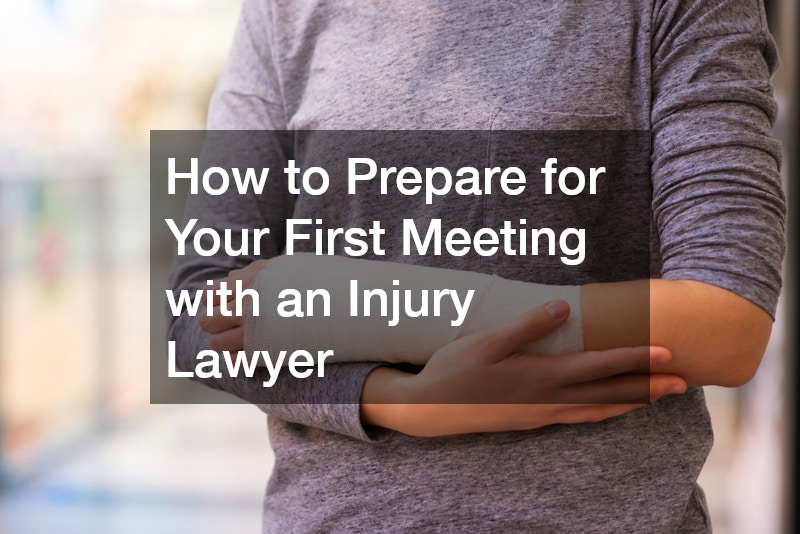
Approaching your first meeting with a personal injury lawyer with thorough preparation is pivotal to influencing a successful case outcome. Hiring an injury lawyer can significantly increase your chances of receiving fair compensation, but preparation is key. By being well-prepared, not only do you present your case more effectively, but you also demonstrate seriousness and commitment.
What Documents Should I Gather Before Meeting?
Medical Records and Bills
Gathering all relevant medical documentation plays a crucial role in detailing the severity and extent of your injuries. Medical records serve as undeniable evidence, showcasing the timeline and intensity of medical interventions. Collecting these documents ensures that your lawyer has a comprehensive view of the treatments undergone and the financial implications involved.
Equally important are the medical bills that accompany these records, as they highlight the economic impact of the injury. These bills not only quantify your expenses but also accentuate the compensation amount your lawyer should aim for in negotiations or court.
Accident Reports
Accident reports are indispensable as they contain a formal account of the incident in question. Often prepared by police officers or official personnel at the scene, these reports contain objective observations and are a critical component of injury cases. Ensuring you have a copy of this report helps your lawyer understand situational dynamics and potential liabilities.
Proof of Income and Financial Expenses
Proof of income and detailed financial expenses are equally vital in portraying the fiscal challenges encountered due to the injury. By compiling pay stubs, tax returns, and financial statements, you exhibit the financial gap from lost wages and potential earnings. It’s essential that these documents are up-to-date and free of discrepancies to avoid challenges during legal processes. This documentation helps the attorney calculate possible compensation, considering the financial footprint of the injury.
How Should I Prepare My Case Story?
Timeline of Events
Constructing a clear and concise timeline of your accident and subsequent events is crucial in painting an accurate picture for your injury lawyer. Start with the date and time of the incident, moving through each key event chronologically. This detailed account aids your attorney in understanding the progression of events and identifying any inconsistencies. Break down the details of the incident, noting precise locations, conditions, and parties involved. A meticulous timeline bridges the gap between subjective memories and objective facts, often proving invaluable during trials or negotiations.
Documenting Your Injuries
The documentation of your injuries should be thorough and ongoing, capturing both initial and subsequent developments. Photographic evidence is particularly effective, documenting visible injuries from multiple angles and stages of healing. Regularly updating these images along with medical feedback provides a comprehensive depiction of your recovery. Maintaining a personal diary or logbook cataloging pain levels, medication effects, and activity limitations offers a subjective insight into the injury’s impact on day-to-day life.
Listing Witnesses and Contacts
Assembling a comprehensive list of witnesses and their contacts is essential in fortifying your case story. Each witness can provide unique perspectives and testimonies, reflecting differing aspects of the incident. Prioritize gathering complete contact details, including names, phone numbers, and email addresses for each witness. This diverse collection of witness statements can prove pivotal, especially when contradictions or gaps arise in opposing narratives.
What Questions Should I Ask My Injury Lawyer?
Understanding Legal Fees and Costs
Before committing to any legal representation, it’s crucial to ask your lawyer about the legal fees and potential costs. Contingency fees are a common arrangement, where the lawyer’s payment is contingent upon winning the case, but it’s essential to confirm the percentage. Clarifying these financials upfront helps to avoid any unpleasant surprises or misunderstandings later in the process. Don’t hesitate to inquire about any additional costs, such as filing fees, expert witnesses, and administrative expenses that might arise. Transparency in this financial relationship can avert potential conflicts and foster trust between you and your lawyer.
Clarifying Case Process and Timeline
Understanding the typical process and expected timeline for your case can prepare you for what’s to come and ensure no step is overlooked. Aim to clarify each phase of the legal process, from filing initial paperwork to potential court appearances or settlements. An experienced lawyer should walk you through each stage, promoting transparency and preparedness.
In summary, thoroughly preparing for your first meeting with an injury lawyer is paramount in setting the stage for a successful case outcome. By assembling the necessary documents, presenting an accurate case story, and understanding the legal process, you enable a smoother experience for both you and your lawyer. Such preparation not only bolsters your case’s strength but also affirms your commitment to obtaining justice and rightful compensation.
.




